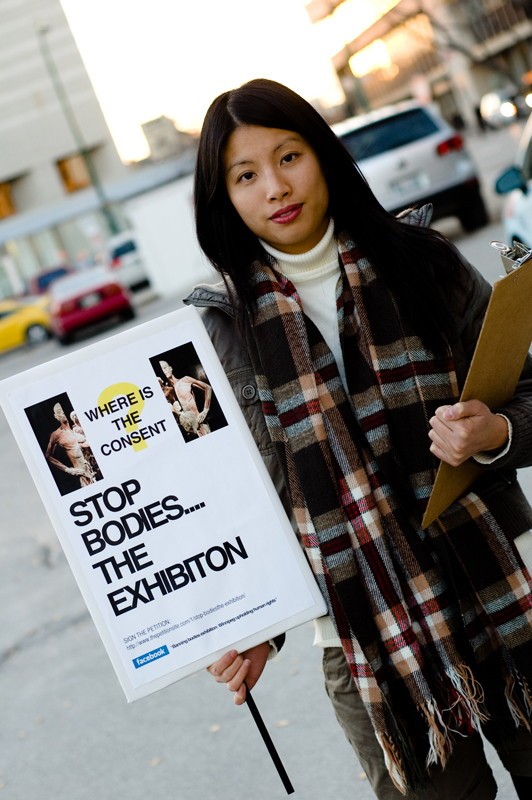Winnipeg’s Chinese Falun Gong community speaks out against Bodies… The Exhibition
Group concerned about human rights violations and disregard for Chinese culture
“These bodies have not been properly laid to rest,” said Judith Cheung, after handing out yellow disclaimers outside of Bodies… The Exhibition at the MTS Centre Exhibition Hall.
“They have been stripped of their skins and put on display.”
Judith Cheung is the chair of the Falun Gong religious community at the University of Manitoba.
Her mother, Maria Cheung, professor of social work at the University of Manitoba, also practices Falun Gong, otherwise known as Falun Dafa, a set of beliefs centered on truthfulness, benevolence and forbearance.
After raising the issue with the U of M’s faculty of social work, the Cheungs have gained its support in an attempt to ban the exhibit.
They have gathered 994 signatures so far via online and paper petitions for the cause. Once they reach 1,000 signatures, they plan to present the petitions to Mayor Sam Katz.
“We’re only petitioning municipal government for now,” Judith Cheung said. “It was the municipal level of government that banned the exhibit in Seattle and San Diego and forced Premier Exhibitions to display the disclaimer in New York.”
The disclaimer on the New York exhibition’s website states that Premier, the North American organizer of the exhibition, can only trust in their Chinese partners’ statements that the bodies do not belong to persons executed while in Chinese prisons.
“Our main concern is the lack of consent from family members to use these bodies in this way,” Cheung said.
“It is also extremely alarming that the bodies are all attained from China, a country with no proper mechanisms of ethical evaluation, no official body donation program and notorious for its persecution of innocent minority groups based upon their spiritual, religious or political beliefs.”
Just as troubling as the human rights concerns, she noted, is the desecration of traditional Chinese culture.
“ These bodies have not been properly laid to rest. They have been stripped of their skins and put on display.
Judith Cheung, chair, University of Manitoba Falun Gong student group
“In China, the dead are buried and enshrined, or sometimes cremated, but always treated with dignity and respect,” Cheung said. “In more traditional Chinese cultures, there are ceremonies lasting for days and dances to ensure the deceased have a safe passage from this world to the next.”
Kenneth MacKendrick, U of M religion professor specializing in death and mourning rituals, agreed and noted that reverence for the dead is not just limited to Chinese culture.
“Every culture has rituals to deal with the dead and the corpses are never just tossed away,” said MacKendrick.
He added that on a religious level, the spirits of the corpses used in this exhibition might be unsettled because they have not been given their final rites.
Terry Russell, professor of Chinese language and literature at the U of M, said this exhibition is also a form of violation against the ancestors under traditional Chinese Confucianism.
“The Winnipeg exhibit should have a similar disclaimer as New York’s,” Russell said.
He added that, according to his research, the processing of unclaimed bodies has become an industry in China, complete with arm’s length bio-medical companies linked to Chinese universities that provide bodies for similar exhibitions travelling across the globe.
Premier Exhibitions’s Atlanta headquarters did not return calls by press time.
The Chinese Embassy in Ottawa has not received any feedback from Chinese Canadians about the exhibition, noted Wang Shi, counsellor of political affairs.
Published in Volume 65, Number 11 of The Uniter (November 11, 2010)







